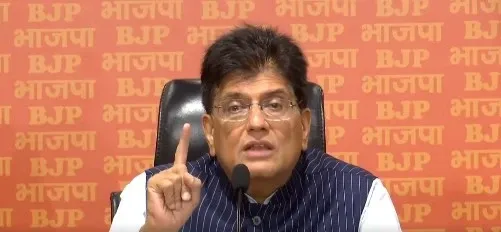Is GST Reform the Biggest Economic Change Since Independence?

Synopsis
Key Takeaways
- GST reforms mark a significant economic change.
- Lower prices on essential goods are anticipated.
- Enhanced collaboration between states and the Centre.
- Investment and employment opportunities should increase.
- Reflects a long-term vision for simplified taxation.
New Delhi, Sep 5 (NationPress) Union Minister of Commerce and Industry Piyush Goyal on Friday praised the recent changes in the Goods and Services Tax (GST) framework as "the most significant economic reform since Independence," attributing the achievement to Prime Minister Narendra Modi's commitment to streamline India's tax system.
During a press briefing at the BJP headquarters in New Delhi, Goyal announced that the updated GST rates—effective from September 22, coinciding with the first day of Navratri—signal a revolutionary phase for the nation.
According to him, "India's economic landscape is soaring with these amendments. For the first time since 1947, we have witnessed such extensive reforms in the tax infrastructure. This is a tremendous relief for consumers and a generous offering to our youth, women, farmers, shopkeepers, MSMEs, and large corporations," he stated.
The Union Minister emphasized that this reform embodies PM Modi's "vision and audacity" to realize what former Prime Minister Atal Bihari Vajpayee had envisioned—consolidating 30 to 35 taxes into a unified tax system.
"Since 2017, the Prime Minister has consistently lowered rates whenever feasible. All states, including those governed by opposition parties, collaborated to finalize the slabs and implement this reform," he added.
Highlighting the advantages, Goyal mentioned that prices for essential items—such as scooters, motorcycles, apparel, footwear, eyeglasses, food items, agricultural products, health insurance, medical devices, pharmaceuticals, televisions, refrigerators, and air-conditioners—will decrease.
He pointed out that reduced taxes would stimulate investment, promote consumption, and create job opportunities. Criticizing the previous UPA government, Goyal remarked that India's financial status in 2014 was "severely compromised" after a decade of Congress governance, characterized by corruption and stagnation in reforms.
"They made grand promises but delivered nothing. The burden of paperwork and taxes prior to 2014 has been consistently alleviated since the GST's introduction in 2017," he asserted.
Referring to the initiative as a "Navratri gift" to the nation, Goyal remarked that the reform not only enhances the ease of doing business but also rekindles trust between the Centre and the states.
"This represents the commitment and vision of Prime Minister Modi, who undertook this courageous step to ensure that every segment of society reaps the benefits," he concluded.









